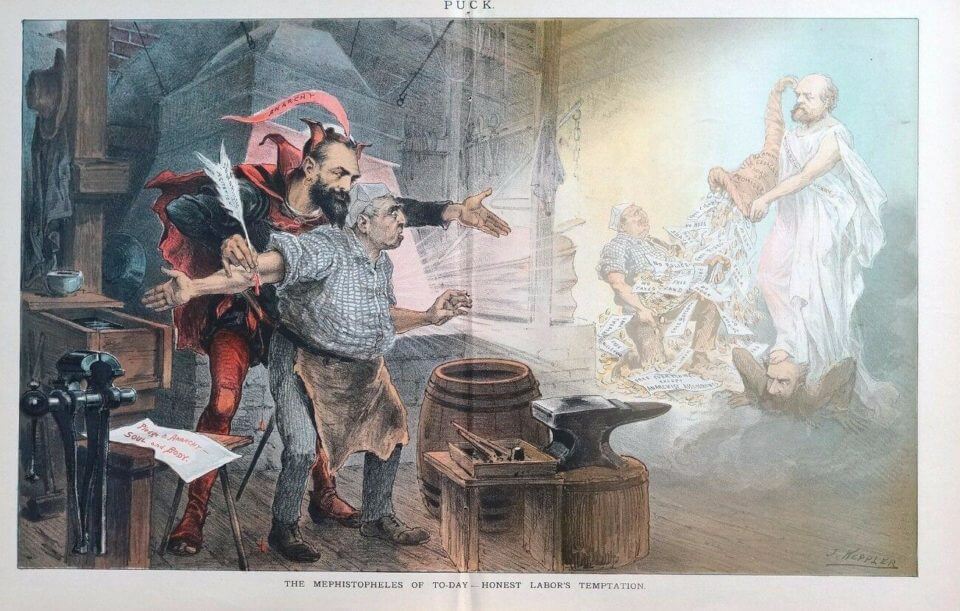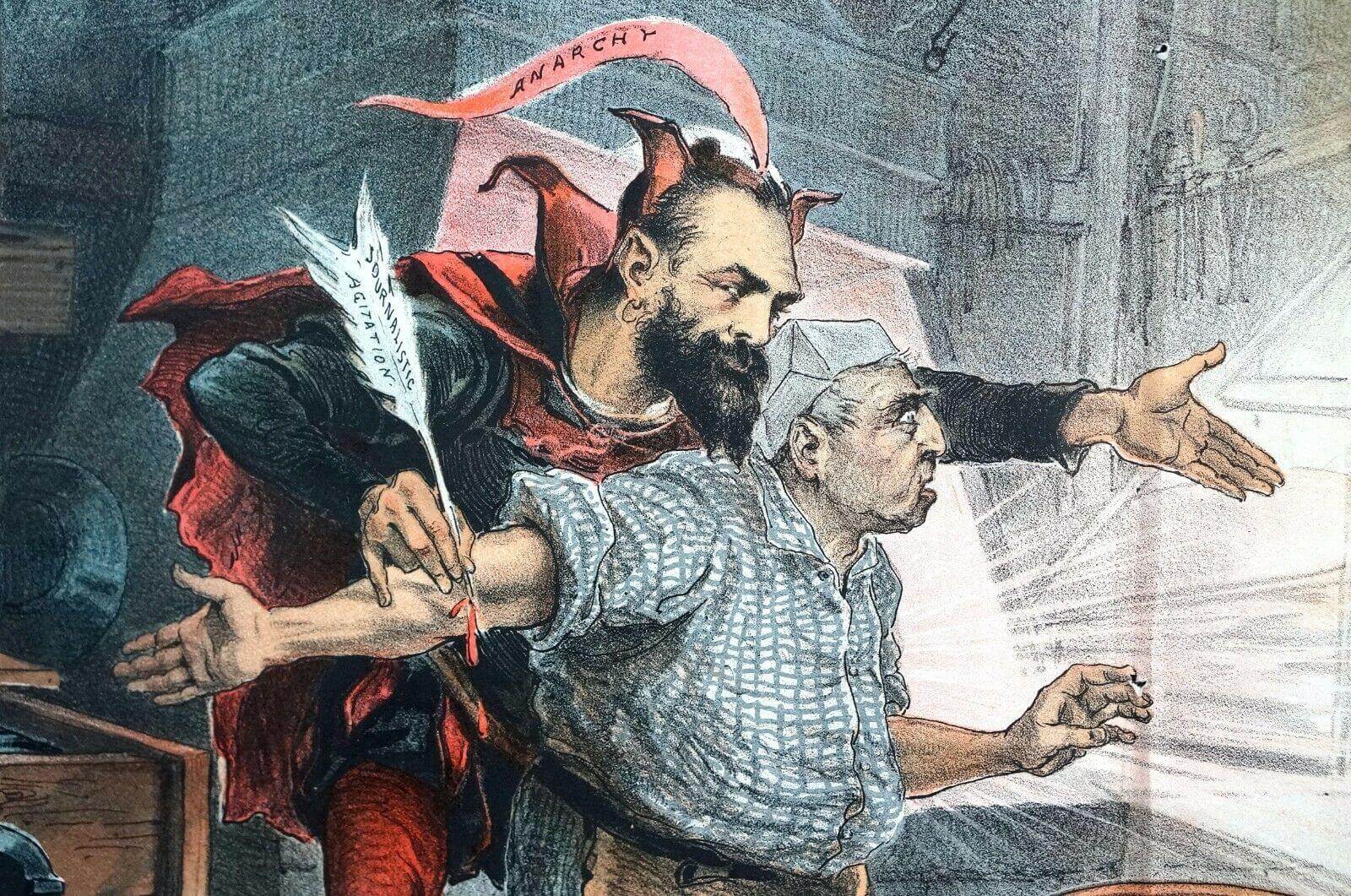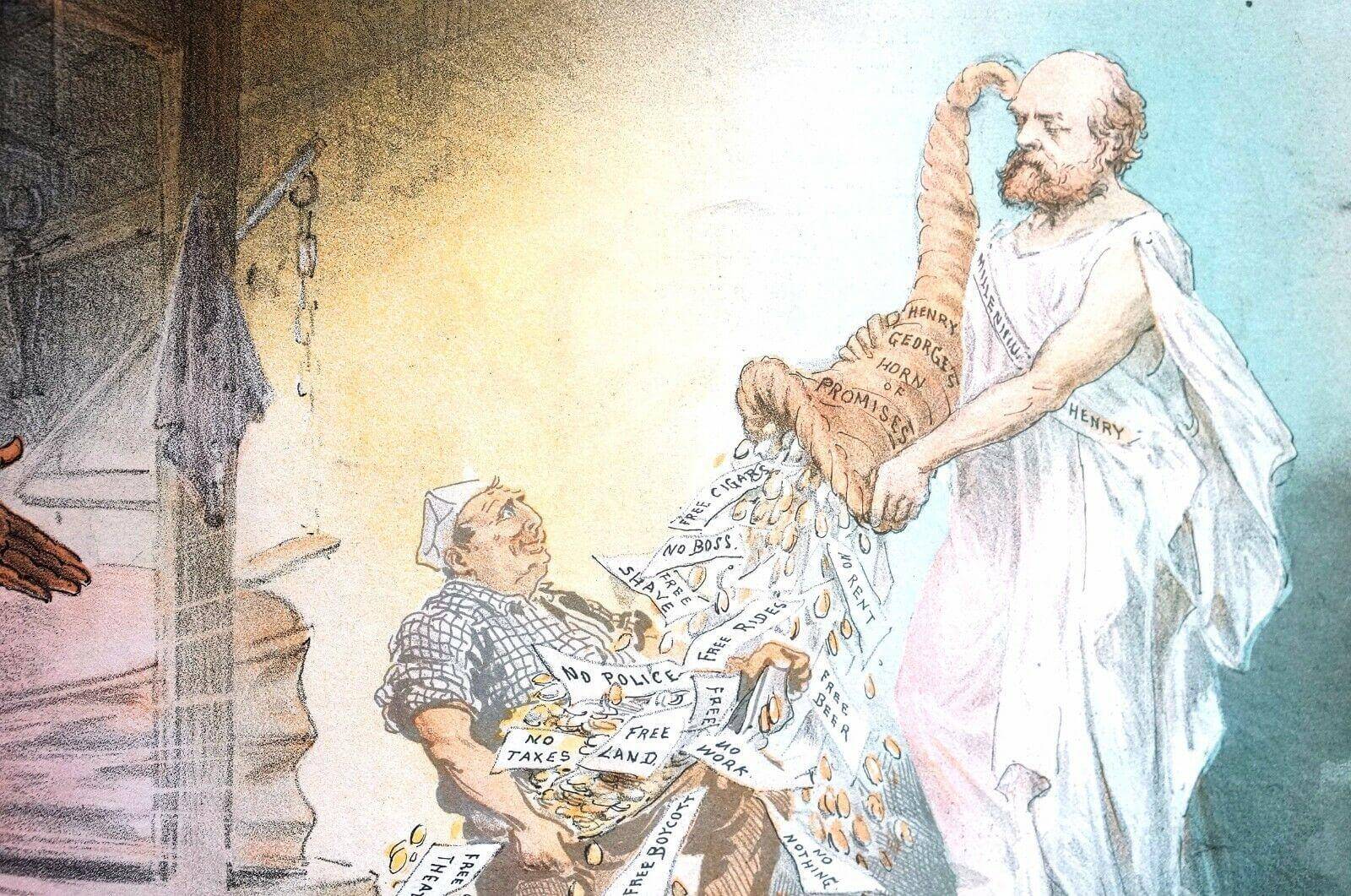
“Georgism dissolves socialism; it is pro-worker and pro-capital at the same time. This is impossible for the socialist who believes to his core that labor can only win if capital loses.”
Preface
“When Karl Marx died in 1883, there must have been dozens of Englishmen who had argued about Henry George for every one who had even heard of the Prussian Socialist.” —Roy Douglas, Land, People and Politics—The Land Question in the United Kingdom 1878-1952 (1976) (p48)
“When I was swept into the great Socialist revival of 1883, I found that five sixths of those who were swept in with me had been converted by Henry George.”—George Bernard Shaw, Tribute to the Work of Henry George (1904)
“Little as Henry George intended it, there can be no doubt that it was the enormous circulation of his Progress and Poverty which gave the touch that caused all seething influence to crystallize into a popular Socialist Movement.”—Sidney Webb, Socialism in England (1889)
“George’s book, indeed, had a more dramatic effect upon British political thought than any work published during the last century. It dominated the minds of the Radical wing of the Liberal Party just as it galvanized into action those who had been groping towards a socialist commonwealth. It even achieved the undoubted feat of making Karl Marx a popular author, for chapters of Das Kapital were published and read as sequels to Progress and Poverty.” —H. Russell Tiltman, J. Ramsay Macdonald (1929)
Introduction
Henry George (1839-1897) is most famous today for having been forgotten. As a journalist in San Francisco, he had witnessed the ending of the American frontier and had long puzzled over why unemployment and poverty, as if by some unknown law, occurred everywhere. He had experienced both, and wrote about the time he’d almost attempted robbery to feed his young family. He went on to become the leader of a movement and toured and spoke across continents.
His signature work, Progress and Poverty: An Inquiry into the Cause of Industrial Depressions and of Increase of Want with Increase of Wealth: The Remedy (1879) started to sell in very large numbers in 1881. Karl Marx received several copies, one from a regular correspondent in America.
Marx wrote to Friedrich Adolph Sorge In Hoboken [London,] 20 June, 1881:
Before your copy of Henry George arrived I had already received two others, one from Swinton and one from Willard Brown; I therefore gave one to Engels and one to Lafargue. Today I must confine myself to a very brief formulation of my opinion of the book. Theoretically the man is utterly backward! … His fundamental dogma is that everything would be all right if ground rent were paid to the state. (You will find payment of this kind among the transitional measures included in The Communist Manifesto too.)
When reading Progress and Poverty, Marx was faced with the charge that he had mistaken a symptom for the disease. While Marx claimed that Capital exploits Labor, George argued that Monopoly—land monopoly—exploits both Labor and Capital.
The outcry against “Capital” on the part of financed labour advocates tends to disguise an older and more formidable enemy of Labou …a system which is in reality the parent of capitalism and all its works and pomps. The capitalist is the objective agency whereby the worker is made to surrender to profit what a just system of wealth distribution would award his labour, but the efficient cause of this underpaid sweat and toil is found in the laws which enable an idle interest to tax both capital and labour.
—Michael Davitt, The Single Tax, Vol 1 No. 1 June 1894
George’s interpretation was phenomenally popular. It penetrated down into the body politic. It explained working class poverty and unemployment, as well as “landlordism” and the resultant land wars in Ireland, Scotland, and elsewhere. It declared that the project to end slavery was not complete: chattel slavery had been abolished, but industrial slavery remained. George made frequent speaking tours and left in his wake scores of Land Reform societies and Single Tax clubs. His proposals radically influenced both Labor and Liberal politics at local and national level in many countries, especially in the United States and Great Britain.
It’s little wonder that Marx was irked. “George … has the repulsive presumption and arrogance which is displayed by all panacea-mongers without exception,” Marx wrote.
It has to be said that Marx was absolutely right. The Single Tax thesis does claim that, “Everything would be alright if ground rent were paid to the state.” It is an astonishing claim, facile on the surface, a panacea: that poverty, inequality, and unemployment are all caused by a tax system fatally incompatible with capitalism and all fixable by doing no more than modernizing that system.
Some captious critics… damn Geofiscalism as a “panacea.” The word betrays a curiously warped mindset: who would damn a solution for the very reason that it is a solution?
—Mason Gaffney, Answer to Futilitarians (1998)
Geofiscal reform would substitute all existing taxes with a Land Value Tax (LVT). This would target the rent of land i.e. that portion of land’s value that does not arise from the labor of the owner. It falls into two categories, natural resources (such as the value of crude oil) and location value (People, of course, pay to live in desirable places; a plot in New York City has a different market value, a higher rent, than one in say, Trenton).
For Marx, land had no special theoretical place; it was one form of capital, a means of production. For George, following classical economics, land was distinct from labor and capital and of equal importance. Land is not capital because it cannot be manufactured; it has no production cost. Land is in fixed supply, vulnerable to monopoly. Land is, in fact, a precondition of labor and capital. We must all “monopolize” a certain amount of land in order to exist. Demand for land is guaranteed; it is a captive market, and we all bid for land. You cannot say these things about capital.
Land monopoly is thus, according to George, a very significant thing. The landowner, as land monopolist, knowing that both capital and labour must bid for land, will always have the power to cream off the wealth they produce, leaving just enough to keep them bidding. The wealth that they generate has the effect of bidding up land values; successful economies have high land values. This effect can be seen everywhere today. Monopoly, not capital is the cause of unemployment, poverty and inequality, and monopoly on land is, by far, the largest monopoly. The land market (so rarely discussed) drives the economy; the boom bust cycle is the land market cycle.
Modern capitalism, as we interpret it, failed to develop along sound and normal lines owing to a very simple reason. This was the failure, in post-feudal times, to collect land values for revenue and the consequent creation of a population permanently unable to buy the wealth it produced. …
All values in the long run accrue as rent and although the superstructure of modern capitalism conceals the fact, vast accumulations of finance capital depend finally on land values. … What the Marxists call surplus value … is an effect of land values accruing privately.
—Henry George and Karl Marx, a talk given by Frank McEachran (1936)
How then, does Marx answer this? In the same letter, after listing some of the precursors to George, he writes:
All these “socialists” … have this much in common that they leave wage labour and therefore capitalist production in existence and try to bamboozle themselves or the world into believing that if ground rent were transformed into a state tax all the evils of capitalist production would disappear of themselves. …
The whole thing is therefore simply an attempt, decked out with socialism, to save capitalist domination and indeed to establish it afresh on an even wider basis than its present one. …
There is no refutation. For Marx, H. George was simply ‘the capitalist’s last ditch.’
… he ought to have put the question to himself in just the opposite way: How did it happen that in the United States, where, relatively … the land was accessible to the great mass of the people, … capitalist economy and the corresponding enslavement of the working class have developed more rapidly and shamelessly than in any other country!
The American economy is modeled on the English system of land ownership—i.e. land value is privatized and untaxed. In the United States, the advance of that system was greatly accelerated because there were no institutions, no established commons, i.e. insufficient population to resist the forces of acquisition. (A.J. Nock’s Our Enemy the State contains a fascinating “Geoist” chapter on the American revolution as the contest to control the economic rent of the new territories.)
To be fair, Marx was aging and probably ill at this time. Is there a more substantive Marxist or socialist critique of Georgism elsewhere? Playwright and Fabian socialist George Bernard Shaw was drawn into politics after hearing George speak in London. Why did he eventually reject Georgism?
If we outgrew Progress and Poverty in many respects, so did he himself too; and it is, perhaps, just as well that he did not know too much when he made his great campaign here; for the complexity of the problem would have overwhelmed him if he had realized it … An Englishman grows up to think that the ugliness of Manchester and the slums of Liverpool have existed since the beginning of the world. George knew that such things grow up like mushrooms, and can be cleared away easily enough when people come to understand what they are looking at and mean business. His genius enabled him to understand what he looked at better than most men; but he was undoubtedly helped by what had happened within his own experience in San Francisco as he could never have been helped had he been born in Lancashire …
—G.B. Shaw, Tribute to the Work of Henry George (1904)

Note that just two years later a Liberal government, propelled by a popular land reform movement—the same one in fact, continued from the 1880’s—and led by David Lloyd George and Winston Churchill, attempted to implement George’s land value tax. It was quite a fight. Shaw underestimated the citizens of Manchester and Liverpool and perfectly illustrates what Roger Scruton calls the, “relentless negativity of the left.”
In another piece on George, Shaw descends into metaphor and minimization:
… in short, of the entire real content of his formula, he seemed to have forgotten everything. What is wrong in society, he rightly argued, had its origin in private appropriation of land. Abolish private appropriation of land, he proceeded, and everything will come right again. This is exactly the reasoning of the peasant who believes that the infallible cure for hydrophobia is shooting the dog…
[The] Single tax levied by Unsocial Democracy is about as possible as watering the streets without wetting them …
Even a dialectical victory for him can only, in the face of the facts, be a reductio ad absurdum of his proposition… Mr. George’s calculation is a piece of sheer economic naiveté; and a very little study of the situation would have shown him that we are too far gone in democracy to make it possible to extend taxation without a corresponding extension of State organization of labour.
—G.B. Shaw, The Hyndman-George Debate, International Review, August 1889
This is no different to Marx. George’s theory is accepted as sound but is somehow trivial and redundant: the Single Tax would work but it will “always be stopped” by “the powers that be” etc.
The point is this: Georgism is a threat to the very basis of socialism. Georgism dissolves socialism; it is pro-worker and pro-capital at the same time. This is impossible for the socialist who believes to his core that labor can only win if capital loses.
George actually felt bound to attack the Socialism he himself had created; and the moment the antagonism was declared, and to be a Henry Georgite meant to be an anti-Socialist, some of the Socialists whom he had converted became ashamed of their origin, and concealed it; while others, including myself, had to fight hard against the Single Tax propaganda.
—G.B. Shaw, Tribute to the Work of Henry George
In 1887, the United Labour Party, with George its leader, broke with its socialist members. No doubt there were several reasons for this, one being the American-individualist convictions of Georgites, another, the need to counter the unceasing socialist/communist/anarchist smear campaign. But for George the fundamental theoretical incompatibilities with socialism could not be ignored. In his newspaper The Standard, he laid out his critique of “Marxian or German” socialism:
This indisposition or inability to analyse, to trace things to their root, and distinguish between the primary and the secondary, the essential and the accidental, is the vice of the whole socialistic theory. The socialist sees that under the conditions that exist today in civilized societies, the laborer does not get the fair reward of his labor, and that the tendency of the competition between laborers is, despite the augmentation of productive power, to force wages to the minimum of a bare livelihood. But, instead of going further and asking the reason of this, he assumes it to be inherent in the “wage system”, and the natural result of free competition. As the only remedy for these evils, he would put an end to the “wage system,” and abolish competition by having the ownership of all capital (including land) assumed by the state. …
The utter impracticability and essential childishness of such a scheme as this is largely disguised to the believers in socialism by a curious pretense of scientific research and generalization, and much reference to the doctrine of evolution. …
Ignoring the essential distinction between land and capital, regarding land as but one of the means of production, of no more importance than steam engines or power looms, and looking to the direction and employment of labor by the state as the only mode of securing an equitable distribution of wealth, socialists do not appreciate the wide and far-reaching consequences which would flow from the simple reform [the Single Tax] that would put all men upon an equality with regard to natural opportunities, and which by appropriating its natural revenue for the support of the state would make possible the freeing of production from all the imposts and restrictions that now hamper it. …

Frederick Engels, the coadjutor of Marx in founding this German school of socialism, has recently written a tract on the labor movement in America as a preface to a new edition of his “Condition of the Working Classes in England in 1884”:
“What the socialists demand implies a total revolution of the whole system of social production; what Henry George demands leaves the present mode of social production untouched.”
The difference is, in fact, even greater than Herr Engels represents it. We do not propose any such violent and radical change as would be involved in the formal resumption of land by society at large, and the letting of it out to individuals. We propose to leave land in individual possession as now, merely taking, in the form of a tax, as nearly as may be, the equivalent of that value which attaches to land by reason of the growth and advance of society. …
This simple yet radical reform would do away with all the injustice which socialists see in the present conditions of society, and would open the way to all the real good that they can picture in their childish scheme of making, the state the universal capitalist, employer, merchant, and shopkeeper. …
Let the socialists come with us, and they will go faster and further in this direction than they can go alone; and when we stop they can, if they choose, try to keep on. But if they must persist in bringing to the front their schemes for making the state everything and the individual nothing, let them maintain their socialistic labor party and leave us to fight our own way. …
—Henry George. Socialism And The New Party, The Standard (August 6 1887)
What would the twentieth century have looked like had the Marxists become Georgists? And why was the Prophet of San Francisco forgotten?.
Darren Iversen is a productivity specialist in England.











